Trump Threatens To Up The Ante On His Trade War
The President is apparently getting ready to take yet another ill-advised step in his ill-advised, economically illiterate trade war.
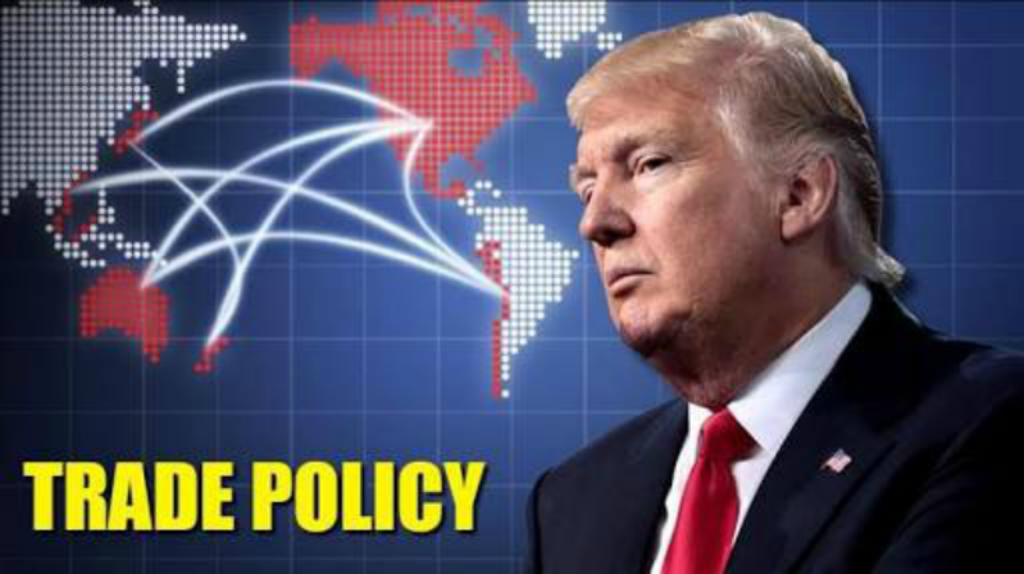
President Trump is threatening to significantly ramp up his ill-advised trade war, this time by threatening increased tariffs on virtually every product imported into the United States from China:
President Donald Trump is prepared to take his tariff fight with China to the max — and believes the stock market’s rise since the election gives him the cushion to do it.
Trump told CNBC in an interview that aired early Friday morning that he would be willing to crank up the tariff pressure on China to the point of hitting $500 billion worth of Chinese imports — meaning U.S. import duties would tax nearly all of the $505.5 billion in total goods and services that Beijing exported to the U.S. last year.
“This is the time. You know the expression we’re playing with the bank’s money,” he told CNBC’s Joe Kernen in an interview on “Squawk Box.”
The comments signal growing confidence that Trump thinks a further escalation in a trade war with China won’t cause mass economic destruction as critics have argued.
Pressed about the possibility that such a move could drag down the stock market, Trump said, “If it does, it does.”
“I would have a higher stock market right now, it’s already up almost 40 percent, as you know, since the election,” Trump said. “It could be 80 percent if I didn’t want to do this, but ultimately, what I’m doing is making it so it’s right.”
Trump has made resetting U.S. trade relationships around the globe a priority for his administration, controversially targeting longtime allies and partners like South Korea, Mexico, Canada and the European Union.
Trump on Twitter also took shots at China and the European Union, accusing them of lowering the value of their currencies, and criticized the Federal Reserve’s gradual interest rate increases — actions that could undermine the impact of new tariffs.
“China, the European Union and others have been manipulating their currencies and interest rates lower, while the U.S. is raising rates while the dollars gets [sic] stronger and stronger with each passing day — taking away our big competitive edge. As usual, not a level playing field,” Trump wrote on Twitter.
“The United States should not be penalized because we are doing so well. Tightening now hurts all that we have done. The U.S. should be allowed to recapture what was lost due to illegal currency manipulation and BAD Trade Deals. Debt coming due & we are raising rates — Really?”
Trump’s comments echo a long-standing complaint from U.S. manufacturers who argue that China and other countries often artificially depresses the value of their currency to give their companies an export advantage. A lower Chinese renminbi — China’s own currency — relative to a stronger dollar allows Chinese companies to sell their products more cheaply in the United States.
But the dollar lately has been strengthening against essentially all currencies, said Fred Bergsten, senior fellow and director emeritus at the Peterson Institute for International Economics.
“The fact that the Chinese currency is going down is not unique,” he said. “The question is whether the Chinese officials have done anything deliberate to push it down.”
As David Lynch notes in The Washington Post, Trump is following a strategy that threatens to spin wildly out of control, assuming it hasn’t done so already:
Perhaps no part of President Trump’s campaign to overhaul U.S. trade policy enjoys broader support than his indictment of China.
Yet if the president’s push to reshape the U.S.-China trade relationship reflects a bipartisan consensus, his method for doing so does not.
This month, Trump threatened to levy tariffs on an additional $200 billion in Chinese products, a move that, coupled with fees already approved, would hit nearly half of China’s shipments to the United States. The administration says Beijing steals American trade secrets, discriminates against foreign companies and subsidizes state-backed enterprises in a way that warps global commerce.
Industry executives and lawmakers agree but fear that Trump’s approach risks an open-ended trade war that will leave American companies with less access to the Chinese market, not more.
“We’re playing Russian roulette with the American economy,” said Myron Brilliant, executive vice president of the U.S. Chamber of Commerce. “The administration has a tool that they think provides leverage over other countries. But I don’t think it has a good strategy for getting a deal done.”
U.S. hopes of exporting more cars to China are among the first casualties. As a conciliatory gesture, Chinese officials in May cut their tariff on imported automobiles to 15 percent from 25 percent. But only days after that reduction took effect on July 1, China hiked its tariff on U.S. cars to 40 percent in retaliation for Trump’s initial levies on Chinese goods.
That means that cars made by BMW in South Carolina or Mercedes-Benz in Alabama and exported to China will face a crippling 40 percent import tax while those shipped from Europe or Japan pay just a 15 percent levy.
“Trump is right that China plays unfair and that unilateral measures are likely needed to get China to play fairer,” said Scott Kennedy, director of the project on Chinese business and economy at the Center for Strategic and International Studies. “But his diagnosis of the underlying dynamics and symptoms is full of key mistakes, which has then resulted in some hideous execution errors.”
[GM says new Trump auto tariffs threaten American jobs]
Trump’s confrontation with China is complicated by his missteps and global trade rules that have not kept pace with China’s blend of authoritarian capitalism, according to trade specialists.
The president — who cultivates an image as an accomplished dealmaker — has repeatedly suggested that his tariffs provide leverage for negotiations with China to end discriminatory trade measures.
The consequences of a trade war are well-known, and none of them are good. On the macroeconomic level, they tend to have a far more negative impact on the economy than a positive one due to the fact that domestic industry ends up getting harmed both due to the higher prices created due to tariffs themselves and the impact of any retaliatory tariffs that may be imposed in response. While there may be some isolated pockets of the economy that benefit from higher tariffs, albeit usually temporarily, the broader impact is inevitably negative even if it may take time for the impact of those higher tariffs to be felt or to register in economic statistics. In addition to businesses being harmed by trade wars, of course, the harm is also felt by consumers who end up paying higher prices for products impacted by increased import duties and for goods that may include products that are subject to those duties, such as automobiles and durable goods such as appliances.
In the United States, there are already signs that the President’s ill-advised trade war, which has led to increased duties on goods not only from China but also from Europe, Canada, and Mexico, is already starting to have an impact. Within two months after the President imposed tariffs on steel and aluminum, for example, The Wall Street Journal reported that prices for both foreign and domestic steel and aluminum were increasing and having a negative impact on manufacturers that rely on these raw materials for their products. Other reports have indicated that American pork farmers were becoming increasingly nervous about their overseas business with nations like China. In Iowa, meanwhile, it has been reported that Chinese retaliation for the tariffs imposed on Chinese goods could cost soybean farmers in the Hawkeye State $624 million this year alone, with the prospect of larger losses if the retaliation continues beyond this year. This has led many leaders in Iowa and elsewhere, including Senator Chuck Grassley to express concern about the impact of the trade war on Republican fortunes in the fall. This is especially true given the fact that the tariffs seem to be expressly targeted toward Trump voters and middle-class Americans. This month has also seen that the tariffs have had a negative impact on other American businesses, and has even led an iconic American brand like Harley-Davidson to announce that they are moving some production overseas in response to the retaliatory tariffs imposed by the European Union.
To be fair, it’s not inaccurate to say that there are some unfair trade practices engaged in by China, the Europeans, and other nations that have a negative impact on the ability of American businesses to compete in those nations. It’s also clear, though, that there are also similar trade practices on the books here in the United States that impose unfair burdens on foreign manufacturers and suppliers. The international agreements that the United States has entered in the past, including agreements such as NAFTA and organizations such as the World Trade Organization, which was specifically established to adjudicate trade disputes between member nations. Additional protections would have been provided by the Trans-Pacific Partnership, but, of course, President Trump pulled the United States out of that agreement as one of the actions he took during his first week in office. These procedures aren’t perfect either, of course, but they are better than the tit-for-tat that we’re seeing unfold before our eyes.
Notwithstanding the fact that there is blame for trade imbalances to be found on both sides of our many trade relationships, one has to be clear where responsibility for the current trade wars, both the ongoing fight with China and the one that appears to be developing between the United States and its most important allies, lies. It’s not in Europe, Canada, Mexico, or in China, it’s right here in the United States in the person of President Donald J. Trump. Even if one could make the case that some of the complaints the President has voiced regarding the status of our trade relations with other nations are accurate, and most of them are not, the proper way to respond to them isn’t by engaging in an ill-advised series of escalating tariffs that will ultimately cause far more harm than good to the American economy.
When the final chapter is written, of course, neither the United States nor China is going to “win” this trade war. Inevitably, the costs of the tit-for-tat tariffs will be felt by the economies of both nations and most especially by the businesses and consumers in both countries. Indeed, the proper way to handle any disputes between the U.S. and China or any other nation would be to take whatever disputes exist to the World Trade Organization for adjudication as provided in the treaty or to negotiate directly. Absent going through the W.T.O., the only hope is that the leaders of both countries will find a way to end the ridiculous tit-for-tat tariffs and reach an agreement that reduces trade barriers in both countries, makes it easier for manufacturers and producers such as farmers in both countries to sell their goods overseas, and reduces the rising tension that inevitably comes from a trade war. Until that happens, though, we’re going to continue to see this kind of nonsense from Washington and Beijing, and the people who pay the price for what they’re doing will most assuredly not be the leaders responsible for what’s happening. That’s apparently not good enough for Trump, and he’s apparently surrounded himself with people such as Gary Cohn and Peter Navarro who agree with him that “trade wars are good and easy to win,” and he has convinced himself that this is the proper way to proceed. If he stays this course, then we’re all going to find out just how wrong he is.

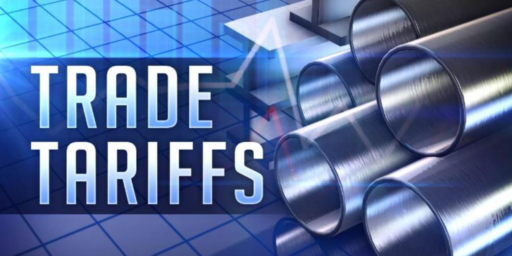
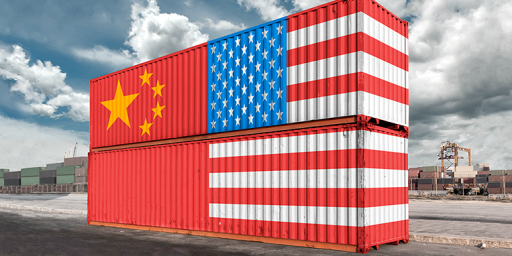
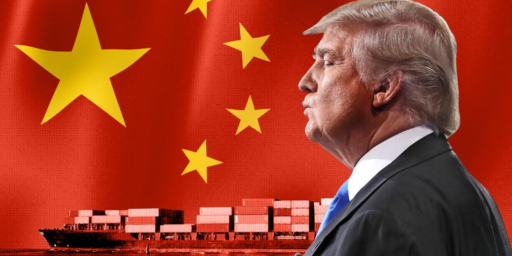
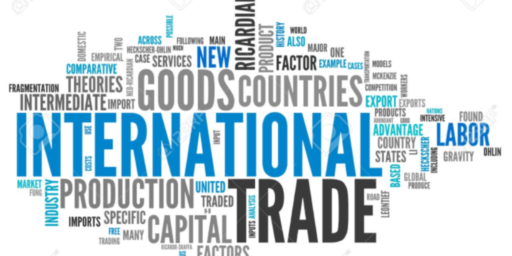

There’s an old saying in Poker: if you can’t identify the sucker at the table it means it’s you. A similar one for negotiations could be: if you can’t articulate what your tangible, specific goals are and how they are prioritized, you are going to get taken to the cleaners.
Trump, being a moron, has no goals or priorities. His staff, who only focus on what will keep them from getting fired or yelled at by the crazy man in the Oval Office, have no goals or priorities beyond reflexive sycophancy.
A moron leading sycophants and toadies. What could possibly go wrong?
Has anyone done the math on what this is going to cost the American consumer? How close are we to one of the biggest tax increases ever?
If only there was someone in the White House who could explain to the president that the huge tax cut strengthens the US dollar (meaning weakening other currencies) in and of itself. On the other hand it would be great if he would stick to his guns about punishing the currency manipulator.
OT: the judge in the Manafort case granted immunity to five witnesses for whom Mueller had requested it. It will get interesting now.
If we are going to discuss mis-guided economic policy…let’s talk tax cuts and wages.
https://twitter.com/business/status/1020645157035704320/photo/1?ref_src=twsrc%5Etfw%7Ctwcamp%5Etweetembed%7Ctwterm%5E1020645157035704320&ref_url=https%3A%2F%2Fwww.vox.com%2F2018%2F7%2F23%2F17602746%2Ftax-cuts-work-bloomberg-wages
@HarvardLaw92:
O’Brien and Laporta worked for Manafort’s accounting firm; Raico was apparently connected with a Chicago bank that lent Manafort $16 million after he left the Trump campaign.
In Trump’s mind, things will go as he imagines them, and he’s upset when they don’t. He seemed to have imagined he’d impose tariffs, and there’d be no retaliation.
He should have known better, as this movie’s been played before. And in every showing, the retaliation falls most heavily on states where majorities vote for the ruling party.
I bet he knew better, because someone must have told him this. But we know he done’st care to take advice from anyone. and if no one on his team warned him, then we’re in more trouble than we imagine.
No president retains much popularity when conditions worsen, especially when the economy goes south. See Bush the elder, who was so popular after the Gulf War many prominent Democrats decided running against him would be futile. he was brought down by a rather mild recession (and perhaps Republican fatigue).
IMO, the best time to take the White House is when the economy’s near bottom or beginning to recover. Too bad for El Cheeto he took office when the economy was doing well.
Trump’s doing a very good job of turning China into the most powerful economic force in the world; this trade war for instance is isolating America, sending its allies into the Chinese camp.
On the other hand, it kind of makes me wonder just how much control Putin has over him. A super dominant China is not in Russia’s (or Putin’s) best interest – I wonder if the Trump-Putin meeting was mainly about Putin trying (apparently unsuccessfully) restrain Trump on this score.
That’s always the problem with an undisciplined puppet like Trump – too much of a loose cannon to be usefully controlled. A disrupted America is good for Russia, but a dominant China taking America’s place isn’t. Putin has to be shaking his head right now at how stupid congress is to let Trump get away with his trade war.
@Timothy Watson:
On drive time, in a financial news segment, I heard a financial reporter say that once the lumber tariffs are in place it may add $8,000 to $10,000 to the cost of building a single family home.
I have an honest question, because I’m flummoxed…
At what point do the markets say “Holy Shit, the US President is out of his freaking mind, and we have no idea what he’s going to do.”
Each day, with the latest Trump explosion on trade, tarrifs and taxes, I expect the market to react to the downside. I know it’s summer and it’s the doldrums when it comes to trading, but… damn… this is non-stop. I don’t understand how the market isn’t putting a brake on the crazy.
Can someone explain it to me? In any other administration, the market would be down 20-30% on the crazy of the last two months alone.
If history teaches nothing else, it does teach that civilizations come and go. They also wax and wane. Many powerful empires who grew to dominate vast areas and peoples, are now objects of forensic study by historians and archaeologists. Others have declined and changed, often becoming unrecognizable in the process.
The Hittite empire, the various Persian empires, the Roman empire, are all gone. China and Egypt still exist, in the same geographic area, but are not what they once were (though China is getting there), or look at Russia.
You can look at a vast nation or empire, marvel at its power, at its capacity for production, at its wealth, and think it will endure as long as the Earth does. But it won’t.
Sometimes a portion survives, and even thrives for a long time. See the Byzantine Empire, which was at one time the Roman Empire of the East, and indeed its inhabitants knew it as the Roman Empire.
But it, too, fell, after a long period of gradual shrinking.
Someday, and that day looks so much closer now, America may splinter, or it may decline, and the people living in the pieces or on what’s left, may look back and read about a once great and mighty nation, the likes of which they may never see again.
@EddieInCA:
Corporations got a fat tax break, and are using it to buy back stocks hand over fist.
Plus, they are being de-regulated so fast it would make your head spin.
Why would they complain?
My only question is how far along the Trump Recession will be by the mid-terms.
@M. Bouffant:
Officially, not even started. I seem to recall the definition of a recession is two consecutive quarters with negative growth. ergo that can’t be called until December 2018 at the earliest, and most likely mid-January 2019.
Unofficially it can be declared sooner, but the effects of tariffs may not be felt much by the midterms. It depends on how things happen, what jobs get cut, what businesses close, etc.
This is not going to go well for Trump. Comments by Lindsay Graham (his voters will have to experience a little pain to win the trade war with China) or by Trump (the high stock market means we are playing with the bank’s money in the fight over trade) will not go over well with voters.
One, I’m not willing to experience pain for his stupid policies. Two, it’s not the bank’s money; the stock market is my retirement money. And definitely not Trumps.
BTW, no one talks about China’s control of 90% of the rare earth market. That is a weapon they are holding in reserve.
@Kathy:
I didn’t think the “American Century” would last forever, but I hadn’t thought W would knock a decade off by being incompetent, and I certainly didn’t anticipate a Trump determined to destroy whatever was left, and my hopes for a soft landing. Why does anyone vote for Republicans? (Rhetorical question.)
@CSK:
Mmhmm. It’s always a good indicator in a financial fraud case when the bankers and accountants are given immunity 🙂
It’s hard to have sympathy for people who constantly vote against there own best interests, especially when the best interests of most of the people in this country are hurt as well…
Could someone release my comment from moderation? Thank you…
@gVOR08:
It’s almost cliche, but I see some parallels to what was going on before the USCW. A short list:
Too much power relative to the citizenry of certain states.
Too much going the way of these states, though at the time it was mostly through the courts rather than Congress, and in this case it’s been only a few years rather than decades.
Lack of significant dialogue across political lines.
But there are differences. Most significantly, the US didn’t have a large standing army (and it was as divided as the country), so state militias plus volunteers could mount an impressive military challenge. These days that’s not the case, even though “state militias” today are National Guard units, which are effectively reserves of the country’s armed forces.
Also the divisions now are not as geographical. While there are die-hard blue and red states, there are also blue enclaves in red states, and red ones in blue states as well.
So things won’t play out the same way, but the possibility of a split, or fragmentation of the country, is real, if perhaps not likely and hopefully remote.
Well, I’ve been informed by my bank person that my portfolio is sufficiently hedged to deal with whatever fluctuations Trump plus Brexit throw at me…
But yah, I’m expecting a world-wide correction when Accidental Brexit (the U.K. falling out of the EU with no preparation) becomes obvious.
And the DJIA has been flat since you started your trade war.
@Bob@Youngstown:
It’s really been flat since the psychological effects of the $1T stimulus wore off.
Probably everyone is done following this thread…but Dennison wants to give $12B to farmers in emergency aid because of damage done by his foolish trade war.
@Daryl and his brother Darryl: So in addition to the massive, regressive tax to which the tariffs equate, we’re now on the hook to fork over $12 billion to farmers so they can let their crops rot in the fields.
Any Trump supporter who calls himself a “fiscal conservative” at this point is either ignorant or lying.
@Mikey:
But he can use all the billions he claimed to have raised from NATO last week! and if not, then Mexico will pay for it.
Where there’s a willing moron, there’s a moronic way to do things.
@grumpy realist:
It’s overdue. This market is being propped up by buybacks, while investors are increasingly finding the exits. That isn’t sustainable.
Not sure exactly when this bubble will burst, but it is coming.